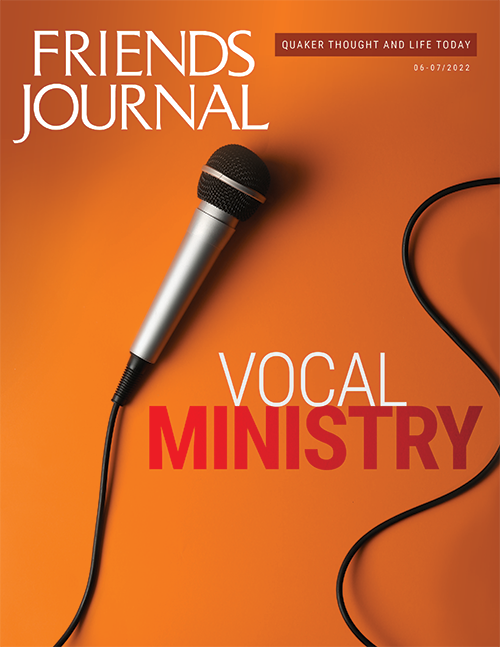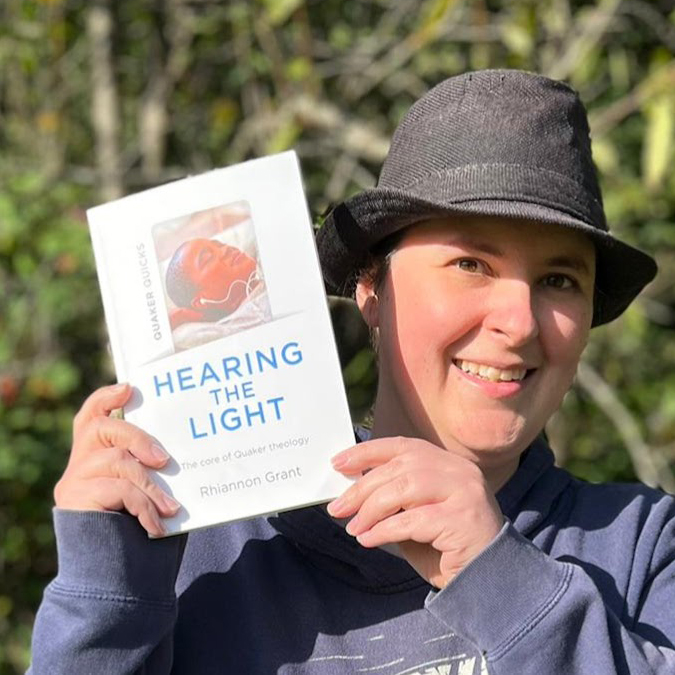The Pros and Cons of Afterwords
A few years ago, I spent the summer investigating the collection of Quaker practices generally known as “afterwords,” “bridging time,” or “afterthoughts.” Supported by Woodbrooke’s Eva Koch Scholarship, my biggest findings were that afterwords is a Marmite sort of practice: people loved it or hated it, were convinced that I should be for or against it, and thought that the main reason for introducing afterwords was to improve the quality of spoken ministry.
“Afterwords,” in the context of unprogrammed Quaker worship, is the practice of making a space at the end of worship for people to share things that can rightly be said to everyone but were not given as ministry during the worship. People often describe afterwords as “not quite ministry”: a time when people can share things that were on their minds but that weren’t shared during worship. The precise details vary: if meeting for worship is expected to last an hour, afterwords might be the final ten minutes of the hour, ten minutes after the hour, or held in another room during refreshments. The time given might shrink or grow depending on who is there. It might be held every week, once a month, when there is a fifth Sunday in a month, or when the person closing meeting for worship feels led to suggest it. In my research in 2016, there was a pattern of change with meetings tending to introduce and remove afterwords relatively often. It seems likely that this pattern will have continued with the pandemic and the other changes that accompany online worship.
Why experiment with afterwords? Changing what your community does together is likely to upset some members in any community, because current practices are working for them or because they prefer the familiar. It can be justified, though, when the hope is to do better at the community’s core function: their meeting for worship. In discussions with me, Friends usually focused on two main hopes for vocal ministry.
Some meetings, those which had very few or no messages in their unprogrammed worship, hoped that introducing afterwords would build up ministers who hesitated too much about speaking to the group. By offering a space where the bar to sharing was lower (where it was clear that it would be okay simply to share some thoughts without the claim to authority or spiritual wisdom sometimes implied by giving spoken ministry), it was hoped that people would become more accustomed to speaking to the meeting community and gain the confidence and skills they needed to answer the call when they were led to give ministry during worship.
Other meetings, those which had too many messages or had vocal ministry that they felt didn’t arise from a true leading, hoped that introducing afterwords would provide a space where those Friends who needed to speak—but weren’t being led—could share without inappropriately taking up space during the worship. By introducing afterwords, some hoped the distinction would help the community better understand what was and wasn’t ministry. Some had even spoken to individual Friends, suggesting that particular topics or kinds of messages should be saved for afterwords. Although my research didn’t identify a single origin for afterwords (and very similar things seem likely to have been invented independently several times), one possible origin may have been to create a space for politically themed messages.
Sometimes these intentions to encourage either more or less ministry seemed to work. There were other times where the effects were dubious: the purpose of afterwords had been forgotten or perhaps had never been shared explicitly with the whole community in the first place.
In working out what is “not quite ministry,” we learn the difference between being led to give messages during worship and wanting to say things in ordinary speech.
However, people also worried about its negative effects. Broadly speaking, I heard of two of these: practical negative effects (mostly related to the time it takes to hold afterwords), and secondly, the potential for the loss of true ministry from the meeting for worship. That a message someone was led to share during meeting for worship might be saved until afterwords—perhaps from lack of confidence in the leading or because it feels easier to speak in afterwords—goes against the intent of afterwords. It was hard to prove that this was happening, but some respondents mentioned it as something that worried them. Another, perhaps even worse, possibility is that people might gain confidence to speak during afterwords and then begin to give inappropriate messages during worship. I’m glad to report that my research didn’t show this was happening.
The practical negatives of afterwords were a widely shared worry. In a time-pressured world, no specific time for afterwords could be agreed upon by everyone. If it is held during the hour usually set aside for worship, people worry that the unprogrammed worship time is reduced. (This is a reasonable prediction since Ben Pink Dandelion said in his “Open for Transformation: Being Quaker” 2014 Swarthmore Lecture that the length of unprogrammed worship has been reduced every century since the seventeenth, and recent research on worship during the pandemic suggests that meetings held online have a tendency to be even shorter.) If afterwords is held following the hour set aside for worship, people worry about the extra time it takes: they want their lunch or their coffee; they want to go and see their families, or get off the computer. If it is held in a different room, so that those who need coffee can go immediately to refreshments and those who want afterwords can opt in, they worry about splitting the community and not getting to see everyone.
Does the time issue affect vocal ministry? Though not directly related, the Iess time spent in community affects its quality, and the quality of the community relates to the confidence we have to share ministry. If afterwords give space to members to practice speaking and sharing with one another and this encourages people to give ministry, then other forms of community activity—where we get to know one another better and feel more secure in our belonging—may also have that effect. Feeling that Sunday morning is too precious to spend ten minutes in afterwords may mean we are not giving enough space for community development, or it might mean afterwords doesn’t help enough to be worth the effort!
Introducing, removing, or merely discussing afterwords might improve the quality of spoken ministry by helping members understand the purpose of ministry. In working out what is “not quite ministry,” we learn the difference between being led to give messages during worship and wanting to say things in ordinary speech.
One image I’ve used to explain the difference is a net or a sieve. The holes in the net only allow true ministry through. Some things feel obviously like ministry: clearly small enough to fit through; other things will be much too big: those are not ministry, and we should save them for another time. But some things are just about the same size as the holes: they might squeeze through to become ministry; they might be saved for a chat over a cup of tea; or we might share them during afterwords. Drawing people’s attention to this testing process and giving them a way to experiment is one of the main functions afterwords can serve.

Photo by Lightfield Studios
One image I’ve used to explain the difference is a net or a sieve. The holes in the net only allow true ministry through. . . . But some things are just about the same size as the holes: they might squeeze through to become ministry; they might be saved for a chat over a cup of tea; or we might share them during afterwords.
In my research on afterwords, people also reflected on different problems they saw in vocal ministry. Some respondents felt that the holes in the net were set too large, and they were hearing ministry in their meeting which didn’t belong in worship: it was too long, too repetitive, too predictable, too personal, too political, too shallow, too reliant on quotations, or too influenced by the news or weather. Other people felt that the holes in the net were now set too small and had noticed signs that their members felt that they must wait to be pulled to their feet—hearts thumping and unable to avoid speaking—even though they had a genuine message that they could have given without going through the discomfort.
In either case, afterwords itself is unlikely to be a direct cure, but the process of introducing or removing afterwords might help. It can work to prompt discussion about vocal ministry in the wider community, give a space for people to articulate different problems, draw attention to the testing process by which each potential minister must determine whether their message is suitable for sharing or not, and generally clarify the situation.
None of these existing challenges with spoken ministry have gone away. The wider use of video conferencing software for worship and the introduction of blended or hybrid worship (any arrangement where some members of the community gather in person and others join the worship online) has introduced new doubts and questions. I have heard some say that ministry online seems to be weaker or less strongly inspired. In my own community, we are blending an in-person and an online meeting, and the proportion of spoken ministry from each side seems to be in proportion to the number attending by each method.
Instead of guessing, what I learned about afterwords leads me to suggest that we should talk more about ministry and worship.
Trying to understand the effects of different ways of participating in worship raises a number of questions I don’t yet feel equipped to answer: What is the effect of worshiping at home versus worshiping in a rented or community-owned space? Which differences in people’s lives—their living situations, financial circumstances, emotional states, neurotypes, levels of introversion and extroversion, experiences of technology, theologies, etc.—affect their experience of online, blended, and in-person worship, and specifically their experience of receiving and giving vocal ministry? It is easy to propose blanket theories and very difficult to prove them, especially when each one invites a counter-example.
For example, we could hypothesize that worshiping online and being distracted by things at home reduces the amount of attention people are able to pay to worship, and hence reduces the quantity and quality of vocal ministry because the community members are simply not listening as well. But we would soon find a meeting—perhaps an online-only meeting, perhaps a meeting where online worship is the main or only experience of meeting for worship—where vocal ministry online is rich and plentiful. We could equally well hypothesize that either worshiping online or being comfortable in familiar surroundings enables people to pay more attention to the worship, indeed enables them to attend worship when it might otherwise be impossible, and hence improves vocal ministry simply because the people are now there to engage in it. And that would be true to some people’s experiences and not others.
Early in the pandemic, when we were in lockdown, I worked on a survey of meetings in Britain Yearly Meeting to see how the move to online worship had worked. One of the main findings was that while roughly the same number of people were attending worship, they were not the same people: on average, for each person who was suddenly included and able to attend, someone else was not joining online worship. My actual hypothesis about spoken ministry—which I cannot yet prove!—is that it has shifted in a broadly similar way: different people attend; different people minister in words or silence; and different experiences provide different material to be shared or not.
Instead of guessing, what I learned about afterwords leads me to suggest that we should talk more about ministry and worship. I’m not necessarily proposing that you approach individuals in your meeting to discuss their personal ministry (although there is a place for curiosity and asking direct but open questions). Rather, we should talk as meetings and communities about our experience of the current situation. Do you find it harder or easier to focus on worship when you are online? Do you quake or tremble when you are led to speak? Is that experience different in a different room, on Zoom, or depending how much coffee you had? At what point do you personally cross the line from “this is on my heart” to “I need to share this”? If your meeting has or could have afterwords, what (if anything) would you share in that space?





Thank you for this article, I’d like to add… for me I experience that after words create a space of listening and community building, like the check in on a zoom , they are a space to share what is on your heart with others who seek to be inspired by community connection.
B
My earlier comment has been removed. This is consistent with my experience of Quakerism. When it comes to group self examination it’s 🙉🙈🙊.
Hi George, I’m not seeing any removed comment. You have been commenting a lot lately (which is great!). There’s comments on five other articles just in June–perhaps it’s one of those other comments that you remember? -Martin, ed.